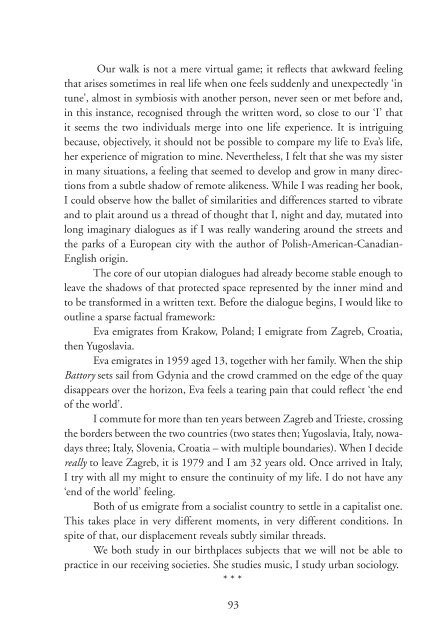Teaching Subjectivity. Travelling Selves for Feminist ... - MailChimp
Teaching Subjectivity. Travelling Selves for Feminist ... - MailChimp
Teaching Subjectivity. Travelling Selves for Feminist ... - MailChimp
Create successful ePaper yourself
Turn your PDF publications into a flip-book with our unique Google optimized e-Paper software.
Our walk is not a mere virtual game; it reflects that awkward feeling<br />
that arises sometimes in real life when one feels suddenly and unexpectedly ‘in<br />
tune’, almost in symbiosis with another person, never seen or met be<strong>for</strong>e and,<br />
in this instance, recognised through the written word, so close to our ‘I’ that<br />
it seems the two individuals merge into one life experience. It is intriguing<br />
because, objectively, it should not be possible to compare my life to Eva’s life,<br />
her experience of migration to mine. Nevertheless, I felt that she was my sister<br />
in many situations, a feeling that seemed to develop and grow in many directions<br />
from a subtle shadow of remote alikeness. While I was reading her book,<br />
I could observe how the ballet of similarities and differences started to vibrate<br />
and to plait around us a thread of thought that I, night and day, mutated into<br />
long imaginary dialogues as if I was really wandering around the streets and<br />
the parks of a European city with the author of Polish-American-Canadian-<br />
English origin.<br />
The core of our utopian dialogues had already become stable enough to<br />
leave the shadows of that protected space represented by the inner mind and<br />
to be trans<strong>for</strong>med in a written text. Be<strong>for</strong>e the dialogue begins, I would like to<br />
outline a sparse factual framework:<br />
Eva emigrates from Krakow, Poland; I emigrate from Zagreb, Croatia,<br />
then Yugoslavia.<br />
Eva emigrates in 1959 aged 13, together with her family. When the ship<br />
Battory sets sail from Gdynia and the crowd crammed on the edge of the quay<br />
disappears over the horizon, Eva feels a tearing pain that could reflect ‘the end<br />
of the world’.<br />
I commute <strong>for</strong> more than ten years between Zagreb and Trieste, crossing<br />
the borders between the two countries (two states then; Yugoslavia, Italy, nowadays<br />
three; Italy, Slovenia, Croatia – with multiple boundaries). When I decide<br />
really to leave Zagreb, it is 1979 and I am 32 years old. Once arrived in Italy,<br />
I try with all my might to ensure the continuity of my life. I do not have any<br />
‘end of the world’ feeling.<br />
Both of us emigrate from a socialist country to settle in a capitalist one.<br />
This takes place in very different moments, in very different conditions. In<br />
spite of that, our displacement reveals subtly similar threads.<br />
We both study in our birthplaces subjects that we will not be able to<br />
practice in our receiving societies. She studies music, I study urban sociology.<br />
* * *<br />
93

















